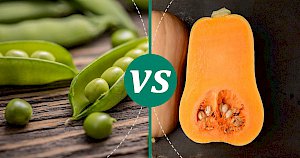Butternut Squash vs Peas: Calories & Nutrition Showdown


Butternut squash vs Peas
Nutrition Facts
Serving size:
change
5g10g15g20g30g40g50g60g80g100g120g140g160g180g200g220g250g300g350g400g450g500g600g700g800g900g1000g
1oz2oz3oz4oz5oz6oz7oz8oz10oz12oz15oz20oz25oz30oz35oz40oz50oz
Amount Per Serving:
Serving size:
change
5g10g15g20g30g40g50g60g80g100g120g140g160g180g200g220g250g300g350g400g450g500g600g700g800g900g1000g
1oz2oz3oz4oz5oz6oz7oz8oz10oz12oz15oz20oz25oz30oz35oz40oz50oz
Amount Per Serving:
Butternut Squash vs Peas 100g Compare
| per 100g | Butternut squash | Peas |
|---|---|---|
| Calories | 45 | 81 |
| Carbohydrates | 11.69 g | 14.45 g |
| Fat | 0.1 g | 0.4 g |
| Dietary fiber | 2 g | 5.7 g |
| Protein | 1 g | 5.42 g |
| Calcium | 48 mg | 25 mg |
| Iron | 0.7 mg | 1.47 mg |
| Magnessium | 34 mg | 33 mg |
| Potassium | 352 mg | 244 mg |
| Sodium | 4 mg | 5 mg |
| Vitaminium A | 10630 µg | 765 µg |
| Vitaminium B1 (Thiamine) | 0.1 mg | 0.266 mg |
| Vitaminium B2 (riboflavin) | 0.02 mg | 0.132 mg |
| Vitaminium B3 (Niacin) | 1.2 mg | 2.09 mg |
| Vitaminium B5 | 0.4 mg | 0.104 mg |
| Vitaminium B6 | 0.154 mg | 0.169 mg |
| Vitaminium B9 (Folic acid) | 27 mg | 0.065 mg |
| Vitaminium C | 21 mg | 40 mg |
| Vitaminium E | 1.44 mg | 0.13 mg |
| Vitaminium K | 1.1 µg | 0.025 µg |
| Beta karoten | 4226 mg | 449 mg |
Discover the Nutritional Face-Off: Butternut Squash vs. Peas
When it comes to choosing nutritious vegetables, both butternut squash and peas offer a treasure trove of health benefits. Each brings its unique flavor and texture to the table, making them versatile ingredients in a plethora of dishes. Before diving into their nutritional comparison, let's explore some interesting facts about these two popular vegetables.
Interesting Facts about Butternut Squash and Peas
Butternut squash, with its sweet and nutty flavor, is a winter squash that has gained popularity not just for its taste but also for its versatility in recipes. From soups and salads to roasts and pies, butternut squash is a favorite in many kitchens. On the other hand, peas, whether fresh or frozen, are a staple in many cuisines around the world, celebrated for their bright color and sweet flavor. Peas are not only used as a side dish but also in soups, stews, and even purees.
Butternut Squash vs. Peas: A Nutritional Overview
When comparing the nutritional profiles of butternut squash and peas, it's clear that both vegetables are healthful choices, but they offer different benefits depending on your dietary needs. Here's a breakdown of their nutritional content per 100g serving:
- Calories: Butternut Squash 45 vs. Peas 81
- Carbohydrates: Butternut Squash 11.69g vs. Peas 14.45g
- Fiber: Butternut Squash 2g vs. Peas 5.1g
- Fat: Butternut Squash 0.1g vs. Peas 0.4g
- Protein: Butternut Squash 1g vs. Peas 5.42g
- Calcium: Butternut Squash 48mg vs. Peas 25mg
- Iron: Butternut Squash 0.7mg vs. Peas 1.47mg
While butternut squash is lower in calories and carbohydrates, making it an excellent choice for those watching their calorie intake, peas stand out with their higher protein and fiber content, beneficial for muscle repair and digestive health. Additionally, peas offer more iron than butternut squash, which is crucial for transporting oxygen in the blood.
Vitamins and Minerals Galore
Both vegetables are packed with vitamins and minerals. Butternut squash is an outstanding source of Vitamin A, with 10630 IU, significantly higher than peas' 765 IU. This makes it excellent for vision health, immune function, and skin integrity. Peas, however, shine with their higher Vitamin C content, essential for immune support and collagen production.
When it comes to other nutrients, butternut squash and peas offer the following:
- Potassium: Butternut Squash 352mg vs. Peas 244mg
- Magnesium: Butternut Squash 34mg vs. Peas 33mg
- Zinc: Butternut Squash 0.15mg vs. Peas 1.24mg
Both vegetables have their strengths, with butternut squash leading in potassium and peas offering more zinc, crucial for immune health and metabolism.
Final Thoughts
Choosing between butternut squash and peas ultimately depends on your nutritional needs and taste preferences. Both vegetables are nutritious, low in calories, and can be a valuable part of a balanced diet. Whether you're looking to boost your protein intake, increase your fiber, or just enjoy a delicious and healthful meal, incorporating both butternut squash and peas into your diet is a wise choice.
So next time you're planning your meals, consider the nutritional benefits of these two versatile vegetables. Whether you're making a hearty butternut squash soup or adding peas to your favorite stew, you'll be nourishing your body with essential vitamins and minerals.
Butternut squash 100g
45kcalCalories source
- 91% CARBS.
- 8% PROTEIN
- 2% FAT
Peas 100g
81kcalCalories source
- 70% CARBS
- 26% PROTEIN
- 4% FAT
Compares of butternut squash
- Butternut Squash vs Artichoke
- Butternut Squash vs Asparagus
- Butternut Squash vs Beetroot
- Butternut Squash vs Calabash
- Butternut Squash vs Broccoli
- Butternut Squash vs Cabbage
- see all compares of butternut squash
Compares of peas
Read also:
- Calories from Butternut squash
- Calories of Cabbage
- Calories in Carrot
- Cassava calories per 100g
- Cauliflower protein per 100g
- How many calories does fodder cabbage have?
- Calories in a half of eggplant
- Calories in whole eggplant
- Calories for one, two or more eggplants
- Calories in slice of eggplant
- How much protein in endive?
Marcin Piotrowicz
calories-info.com creator
Healthy diet and healthy lifestyle promoter
Add comment